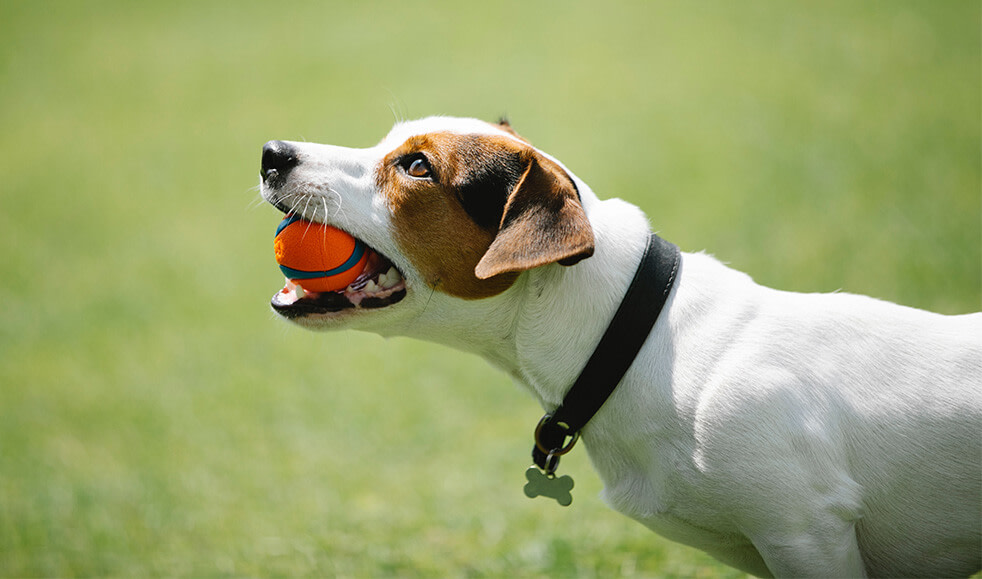Intestinal blockage in dogs is a serious matter. We explain how to recognize it and how you can help your furry friend.
- What is Intestinal Blockage in Dogs?
- Symptoms: How Can I Recognize Intestinal Blockage in Dogs?
- Types of Intestinal Blockages in Dogs and Possible Causes
- Possible Treatments for Intestinal Blockages
- When Should I See a Veterinarian if Suspecting Intestinal Blockage?
- How to Prevent Intestinal Blockage in Your Dog
What is Intestinal Blockage in Dogs?
You may have heard that intestinal blockage (medically known as Ileus) in your furry friend can be dangerous. But what is it exactly? As the name suggests, intestinal blockage is a hindrance in the normal functioning of the intestines. This means that the organ’s functionality is impaired, and only a part of the food mash, or in the worst-case scenario, nothing at all, can pass through the intestines.
Symptoms: How Can I Recognize Intestinal Blockage in Dogs?
Prompt action is required in the case of intestinal blockage. However, you can usually recognize a blockage of the intestines only after a few hours. Therefore, it is essential to observe your pet for a few hours and learn about how dogs behave with intestinal blockage. Even before you notice that your dog can no longer defecate, animals often assume the so-called prayer position. They bend their upper body downwards and raise their buttocks in the air.
The following signs may indicate intestinal blockage in dogs:
- little to no bowel movement
- straining to defecate
- repeatedly assuming the prayer position
- frequent vomiting of any food and liquids
- hardened and bloated abdomen
- grass-eating
- weakness, lethargy, fatigue
- fever or low body temperature
- sensitivity to touch on the abdomen, abdominal pain
Keep in mind that the passage of food through the intestines (from eating to the elimination of feces) takes at least 24 hours, often even longer. Consequently, it may take some time for symptoms to appear in the case of intestinal blockage. If you are unsure, it is advisable to contact a veterinary clinic.

Types of Intestinal Blockages in Dogs and Possible Causes
In general, two forms of intestinal blockage in dogs are distinguished:
Mechanical Ileus:
Mechanical intestinal blockage involves complete or partial obstruction of the intestines. The digested food mash becomes impassable. As a result, the food mash gradually accumulates, and the intestinal tract expands.
Possible Causes: In most cases, mechanical intestinal blockage in dogs is caused by ingested foreign objects such as wood pieces, bones, toys, chestnuts, or stones. Especially during teething, young dogs intensify their desire to put objects in their mouths. Appropriate chew treats can satisfy the dogs’ chewing needs.
A massive infestation of intestinal parasites, gallstones, tumors, or twists in the intestines can also be the cause of mechanical intestinal blockage in dogs.
Functional Ileus:
Functional ileus refers to intestinal paralysis or another malfunction of the intestines. The consequence can be a cessation of intestinal motility. The intestinal passage is disrupted, and the food mash accumulates in the increasingly full intestines.
Possible Causes: Functional intestinal blockage is often caused by nervous system disorders leading to a cessation of intestinal activity. However, inflammations such as pancreatitis, circulatory disorders, or poisonings can also cause functional intestinal blockage.

Possible Treatments for Intestinal Blockages
Examination and Diagnosis:
Intestinal blockage must always be treated by a veterinarian. Depending on the dog’s condition and the occurring symptoms, various examinations are initially performed. Typically, the abdomen is palpated, temperature is measured, and the oral cavity is examined.
Subsequently, an ultrasound is used to determine whether your dog is indeed suffering from intestinal blockage. In some cases, this is sufficient for a definitive diagnosis, while in others, additional X-rays may be necessary. In cases of unclear causes, a diagnostic opening of the abdomen (abdominal exploration) may sometimes be required, followed immediately by a surgical procedure.
Treatment:
The necessary treatment measures depend on the cause and severity of the intestinal blockage in your dog. In simple cases, the administration of laxatives or antispasmodic medications may be enough to resolve the blockage.
If your dog has swallowed an object or if the intestinal blockage has progressed, surgical intervention is usually necessary. The swallowed object and persistently damaged sections of the intestine must be removed, and the healthy sections of the intestine are stitched together. Following the operation, your pet will typically need to spend a few days in the veterinary clinic for optimal care.

When Should I See a Veterinarian if Suspecting Intestinal Blockage?
If you suspect that your dog has an intestinal blockage, you should contact your veterinarian directly. There is no way around treatment by a veterinarian in the case of intestinal blockage. If left untreated, the blockage can lead to the death of the animal. In general, if you think your dog has swallowed something or ingested something toxic like a poisonous bait, prompt action is essential.
How to Prevent Intestinal Blockage in Your Dog
To prevent it from happening, there are several things you can do to avoid intestinal blockage in your beloved pet:
- Provide a balanced and species-appropriate diet with a sufficiently high fiber content to support a healthy digestive tract for your dog.
- Avoid low-quality dog food with artificial additives such as sugar, grains, or labels containing “animal by-products.”
- Ensure an adequate fluid intake to support digestion.
- When giving bones, such as during BARFing, monitor your dog and teach them to chew bones thoroughly.
- Dog toys should not be easily chewed apart and should be the right size to prevent your dog from swallowing them. Caution: Balls can quickly end up in a dog’s stomach or, worse, in their windpipe due to unfortunate incidents!
- Train your dog early on not to pick up anything from the ground. Chestnuts, acorns, nuts, stones, and sticks are not suitable dog toys.
- Regular exercise (at least 2 hours per day) stimulates intestinal activity and helps prevent intestinal blockage in your dog.
- Proactively treating intestinal parasites such as worms and Giardia can contribute to maintaining intestinal health.


